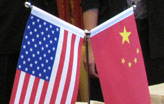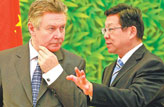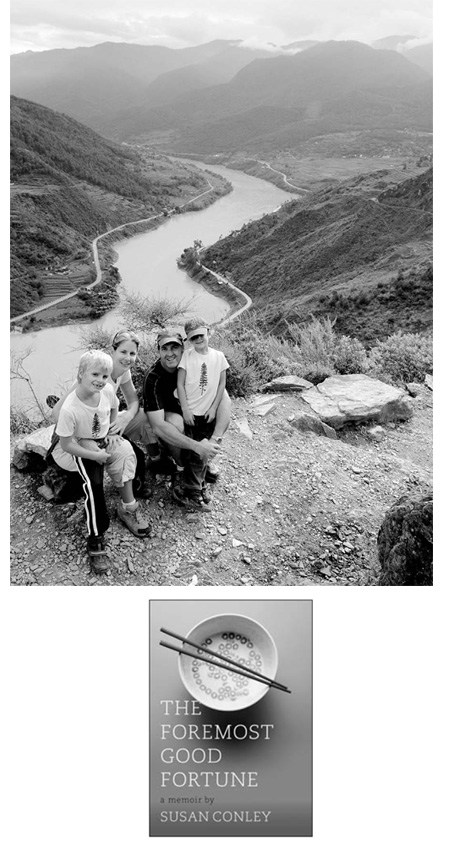Life
Oceans apart
Updated: 2011-07-18 14:19
By Rebecca Lo (China Daily)
|
Top: Susan Conley happily exploring in China with her husband, Tony, and their two sons, Thorne and Aidan. Photos by Tony Kieffer and Laura Lewis / for China Daily Above: The Foremost Good Fortune is published by Random House. Provided to China Daily |
American writer Susan Conley revisits her two years in Beijing battling breast cancer in her memoir - and in a chat with Rebecca Lo.
It is a rainy night in Portland, and Susan Conley has just tucked into bed her two boys, Thorne, age 10 and Aidan, age 8. She has not quite recovered from the residual jet lag of two weeks in Asia on a book tour promoting her memoir, The Foremost Good Fortune. And I am making her think, forcing her to dig deep and dissect some of the book's themes that express the trials and tribulations of an expat mom living in China with cancer.
"Language and communication were the heart of the book for me," she admits. "I found Mandarin fascinating. But when I got breast cancer, I forgot all of it! It was an easy way out. Cancer was a language metaphor. I had to let go of Mandarin to get through the cancer world. Mandarin demanded all of my attention."
A creative writer of fiction and poetry, Conley was teaching in a writer's workshop, The Telling Room, when her family of four uprooted and moved to China. They lived in Beijing from summer of 2007 to December 2009 after her husband, Tony Kieffer, was transferred to the capital to teach credit rating systems to fellow bankers. He still travels to China every other month on business.
They moved from a house in Maine to a high-rise apartment on the Fourth Ring Road in time to see full Olympic mania in progress. The original plan was for two years; after nine months, Conley discovered lumps in her left breast.
 |
The book is primarily the experience of a mother struggling to make a home for her family in a country where she does not speak the language. Throw into the mix the added burden of facing a deadly disease in a place where everything, from a doctor's visit to making new friends, is foreign territory ripe with challenges. To get through it all, she learned to let go and rely on the people around her. She worked hard at developing relationships with people such as her personal trainer, Marcus; her driver, Lao Wu; her English teacher, Rose; and her ayis (maids).
"We are not used to these hierarchies," she admits. "I'm a Yankee from the northeast US. We are very hardy; we cut our own wood and forage for berries. We get our own maple syrup from trees. I was never comfortable with hierarchies. But I must have realized that those people were touchstones for me in terms of culture.
"I arrived in China and wanted to write this book. But the only way to look inside were through my kids. Then I saw that there were these people who I was paying. They became my frame. I asked a lot of questions. I wasn't there just for the ride.
"People love stories. We're so inherently drawn to narrative. Maybe I was always answering those simple, obvious questions. I was telling the story of Rose and my ayi and Marcus. Here are some real, live, human stories."
Conley also touched a nerve that resonated with most women: She wasn't the perfect mother and she readily admitted to needing her own space. She used the metaphor of having a place inside her head where she retreated to when things with her boys got too manic to deal with. The theme continues to resonate through the metaphor of Mandarin and then cancer as a sea in which she is swimming alone.
"A lot of women can feel on edge if they are just being nurturers," she says.
"But as an expat mom, I was called upon to be more of a mother than I had ever been. I really had to stop everything and make it work for my family. My husband was busy opening up an office there for his company. He had the stats: the number one reason why startups don't work is because of a spousal problem. Many people don't last in China. It's too hard."
Conley credits her two-and-a-half years in China with positive changes as a writer and a mother. Her sons and husband still speak Mandarin to each other, and they thoroughly enjoyed their recent trip back to Beijing to see old friends. "I have a much bigger appetite for chaos now!" she laughs. "There was such giving up of control there. I'm so grateful for it. I am a more humble person and it may have something to do with trying to understand the scope of China. It is so vast and epic."
Similarly, living with cancer has helped her writing deepen, and she feels she now lives with more authenticity and belonging. "It has changed my writing for the better. I am rewriting a death scene in a novel I've been working on, and I know that I now have some credibility there.
"What I miss the most about China is the feeling that change is possible. The entrepreneurial gold rush was on. The capitalistic fever goes uncensored.
"The American perception that there is a communist clamp down and no free enterprise are so not the case.
"There is so much more personal freedom than I expected. Yes, I think we would live in China again. We are lucky to keep China in our lives."
You can contact the writer at sundayed@chinadaily.com.cn.
(China Daily 07/17/2011 page4)

Specials

China-US Governors Forum
The first China-US Governors Forum is held July 15 in the Salt Lake City, the United States.

My China story
Foreign readers are invited to share your China stories.

Rare earths export quota
China kept its export quota at almost the same level as last year.
